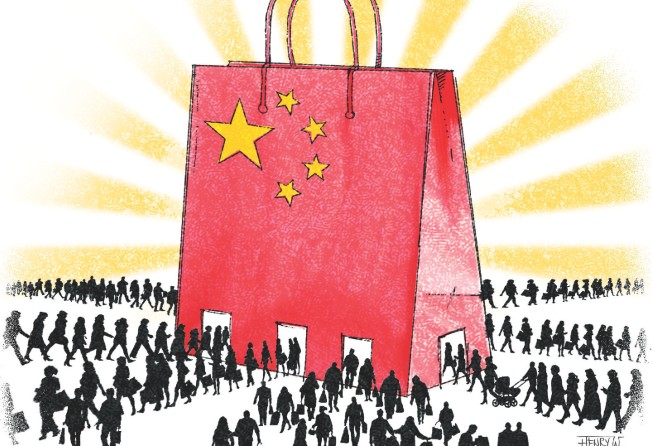How young, upwardly mobile consumers are shaping China
Kevin Martin says a new wave of young, status-conscious middle class with a global mindset is driving China towards a consumer society, offering abundant opportunities for business

China's economy, boosted by a wave of growing middle-class wealth, is undergoing a significant shift in consumption, driven by a new generation of young, prosperous and independent consumers. The country's huge population and strong economic growth will make it the world's powerhouse of middle-class consumerism over the next two decades.
Today, China's economy is still heavily dependent on investment for growth: consumption only accounted for 50 per cent of gross domestic product last year, significantly less than the US, at more than 80 per cent, and even India, which was over 70 per cent.
The eastern region is home to the most affluent consumers, particularly the tier-one cities of Beijing, Shanghai, Guangzhou and Shenzhen. The region's tertiary sectors have the highest share of GDP of the 31 provinces and municipalities, mostly consisting of retail consumption, finance and IT services. It has the highest per capita retail consumption in China since it has the country's highest average wages as well as robust spending by tourists. Guangzhou has become the only city where retail consumption has contributed more to GDP than fixed-asset investment for the past 12 years.
The eastern region's position won't change, but the geographic centre of China's middle class is also shifting because less developed inland provinces have grown faster than rich coastal regions since 2007 and now account for 49 per cent of total GDP. Middle-class growth rates will be much higher in smaller cities in the north and west, and much of the rest of the country is expected to follow.
The government is now encouraging more people to spend. As a result, consumption in China will account for 60 per cent of GDP by 2020, according to a report by the International Data Corporation. That's the equivalent of adding just under US$1 trillion of consumer spending even at today's levels.
A massive push to urbanise will propel tens of millions of people and billions of yuan into the consumption equation. Spending by urban Chinese households is set to increase from 10 trillion yuan (HK$12.49 trillion) in 2012 to nearly 27 trillion yuan in 2022, according to McKinsey.
A new middle class of status-conscious upwardly mobile young people with a global mindset is turning China towards a consumer-driven future. They are confident, independent-minded, less price-sensitive and determined to display their worldliness through well-considered consumption. They are loyal to brands and prefer niche goods over mass-market products. Most are the only child in their families, and frequently the children of only children, giving rise to the so-called "4-2-1" dynamic: the savings of four grandparents and two parents are funnelled into the pocket of a single child.
This family model, coupled with rising per capita household incomes, is unleashing a wave of needs and aspirations that are getting people to rethink the way they save and increase wealth. People are not only thinking about achieving or maintaining a certain quality of life, they also aspire to a good education for their children, both locally and overseas. The prospective rising salaries that accompany well-educated graduates will reinforce this trend. Looking to the future, with one child potentially supporting four people in their old age, financial security in retirement is also a growing concern.
However, the ways the Chinese middle class have been maintaining their wealth so far is unsophisticated. Property has long been one of the most popular means of investment, given the lack of diversity in financial investment products. Wealth management products are now becoming popular for this reason. Retail investors are seeking higher returns than interest paid on traditional savings accounts. There will be a growing need for a variety of such products in the future, such as mutual funds and insurance.
Other areas that will present clear opportunities as China's consumer society develops include tourism, luxury brands and technology.
China already provides the world's largest number of overseas tourists and the largest proportion of tourist spending, yet is still far from reaching its full potential. Chinese tourists made an estimated 98 million trips abroad last year, spending over US$120 billion on travel, while China also saw 3.3 billion domestic tourists, spending 2.6 trillion yuan around the country.
Outbound travel from China is expected to reach 130 million by 2015 and possibly top 200 million by 2020, which is three times the current number of departures from the United States, the world's number one travel nation until now.
As the confidence of the new wave of Chinese tourists grows, spending patterns are changing and more independent travellers are expected to spread out from traditional tourist spots to niche markets. One factor driving the extraordinary growth in overseas tourism is the attraction of luxury brand shopping. Chinese consumers are developing a taste for the finer things in life. Western luxury brands have done particularly well in recent years because they are associated with a high quality of life and sophistication.
Some people are also looking for the cachet of products not available in the domestic market. Their top destinations include Hong Kong, Europe and the US.
With digital technology becoming part of everyday life, China's luxury boom is moving to the web. China has become the world's biggest e-commerce market, with spending forecast to reach US$540 billion next year.
As the world's biggest manufacturer and consumer of smartphones, it will soon be the largest "mobile commerce" market. These all play a role in increasing domestic consumption, which will drive further development and economic growth.
The future of the global economy will be profoundly shaped by China's push towards consumerism. Local and multinational firms in China need to be able to generate sought-after consumer experiences and keep up with rapidly changing trends.
Kevin Martin is Asia-Pacific regional head of retail banking and wealth management at HSBC